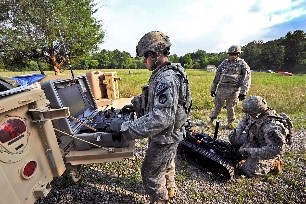

WASHINGTON – The U.S. Army has announced new funding contracts with 13 small businesses to develop innovations in materials science, artificial intelligence and machine learning, sensing and other urgent Army priorities in order to transition game-changing solutions to the Soldier.
The Army Applied Small Business Innovation Research Program is awarding these Phase II contracts, worth up to $1.7 million for an 18–24-month period, for the companies to focus on the development, demonstration and delivery of innovation from their initial Phase I awards. Army Applied SBIR Program releases contract opportunities on an ad hoc, rolling basis for U.S.-based small companies to identify solutions to some of the Army’s most critical modernization priorities.
These new Phase II awards enable technology in autonomous platforms; command, control and communications; power generation and management; manufacturing and manufacturability technologies; sensing; and artificial intelligence and machine learning.
More than 24 companies submitted a Phase II proposal, which consisted of a 15-minute pre-recorded presentation, followed by a 10-minute live Q&A session with a panel of Army subject matter experts as part of a series of virtual pitch events from June 18-25.
“The Army recognizes the importance of partnering with small businesses and the need to inject innovation into our system,” said Dr. Matt Willis, director of Army Prize Competitions and the Army Applied SBIR Program in the Office of the Assistant Secretary of the Army for Acquisition, Logistics, and Technology. “When a company receives a Phase II award, it’s another step toward turning over a new technology that has the potential to be lifesaving to the U.S. Soldier.”
The 13 companies that received contract awards are:
These technologies represent a cross-section of critical technology solutions for the Soldier, and were identified through the inaugural xTechSearch SBIR open topic solicitation in 2019. Each technology, and associated Phase II proposal was evaluated by a panel of Army subject matter experts who considered each program’s proposed cost, schedule and performance implications for the Army.
“These technologies represent the most promising technical solutions with viable transition strategies to support Army customers,” said Willis.
The congressionally mandated Army Applied SBIR Program fosters, encourages and strengthens the role of small businesses to meet Army research and development needs. The program helps businesses overcome the inherent challenges of working in government research and development compared to their larger counterparts, and connects companies with Soldiers and Army technical and subject matter experts to talk shop – whether it’s about the latest tech or the challenges on the battlefield.
The Army Applied SBIR Program also announced a new contract opportunity in Holistic Wind Correction for Aviation Targeting. The official submission period opened July 21 and closes August 24 at noon EST. To view this topic and learn the latest about the Army Applied SBIR Program, visit the Army SBIR|STTR Program website.
###
The Office of the Assistant Secretary of the Army for Acquisition, Logistics & Technology provides the American Soldier with a decisive advantage in any mission by developing, acquiring, fielding and sustaining the world’s finest equipment and services; and by leveraging technologies and capabilities to meet current and future Army needs
